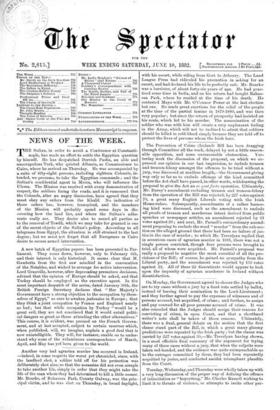On Monday, the Government agreed to choose the Judges who
are to try cases without a jury by a fixed vote settled by ballot, instead of leaving their nomination to the Lord-Lieutenant ; and they further agreed to pay the expenses of witnesses and of persons accused, but acquitted, of crime; and further, to assign and pay counsel for all poor persons accused of crime. It was also conceded that the Judges should assign their reasons for convicting of crime, in open Court, and that a shorthand writer's note shall be taken of those reasons. Ultimately, there was a final, general debate on the motion that the first clause stand part of the Bill, in which a great many gloomy predictions were repeated by the Irish party ; but the clause was carried by 227 votes against 39,—Mr. Trevelyan having shown, in a most effectiie final summary of the argument for trying many of these cases without a jury, that when the culprits were taken red-handed, and the evidence was quite unimpeachable as to the outrages committed by them, they had been repeatedly acquitted by juries, and conducted amidst triumphant plaudits from the Court.




































